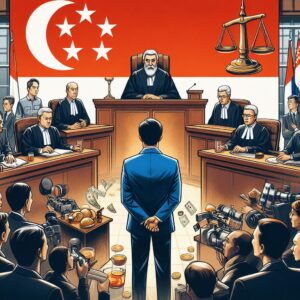 In a stunning development that has resonated across the typically upright Singaporean political world, a prominent member of the Cabinet, Subramaniam Iswaran, has been indicted on corruption charges. Known for his former role in shepherding Singapore’s tourism sector during the city-state’s launch of the Formula One Grand Prix, Iswaran has staunchly pleaded innocent to an array of 27 counts detailing the acceptance of illicit gains as a civil servant.
In a stunning development that has resonated across the typically upright Singaporean political world, a prominent member of the Cabinet, Subramaniam Iswaran, has been indicted on corruption charges. Known for his former role in shepherding Singapore’s tourism sector during the city-state’s launch of the Formula One Grand Prix, Iswaran has staunchly pleaded innocent to an array of 27 counts detailing the acceptance of illicit gains as a civil servant.
The unfolding of this scandal has rattled Singapore, a country renowned for its robust governance and transparency. Iswaran vacated his governmental duties this past Thursday, following the charges leveled against him that cover receiving over S$160,000 ($119,145; £93,850) in extravagant flights, hotel accommodations, and coveted Grand Prix tickets, allegedly in exchange for favors aiding the commercial ventures of the notable property magnate Ong Beng Seng.
In the comprehensive charge sheets made public, there are accusations involving tickets to high-profile West End shows and premier league football games. Iswaran’s apprehension the previous year coincided with that of Mr. Ong, a key figure in bringing the prestigious F1 event to Singapore back in 2008. Mr. Ong is repetitively cited alongside Iswaran in the corruption allegations, pinpointed as the source of the supposed kickbacks.
In his communication to Prime Minister Lee Hsien Loong, Iswaran proclaimed his unwavering rejection of the charges mounted against him, asserting his innocence. Concurrently with the announcement of his departure from office, he committed to reimbursing his salaries and perquisites from the time the investigation into his conduct was inaugurated last July.
Despite being legally sidelined after his apprehension and being put on leave, Iswaran continued to receive a monthly remuneration of S$8,500 and an MP allowance surpassing S$15,000. Within the context of a nation where legislators are among the best remunerated globally and where ministers command beginners’ pay exceeding S$45,000 per month, this pay structure has been traditionally defended as a guard against corrupt practices.
Iswaran’s extensive political journey comprises directorial roles in top-tier corporations and myriad ministerial responsibilities, such as those within the prime minister’s office, home affairs, and communication sectors, and most recently, the transport ministry. It was his considerable tenure in the trade and industry ministry where he left an indelible mark, playing a pivotal role in shaping Singapore’s tourism scene, which saw substantial investments in the 2000s and 2010s catalyzing the development of casinos, hotels, tourist hubs, and marquee events like the F1 spectacle.
The ordeal confronting Iswaran has cast a shadow on the ruling People’s Action Party (PAP), which prides itself on its uncompromising position against corrupt behavior, marking one of the few times a scandal of this nature has surfaced, putting the party’s reputation at stake.
Prime Minister Lee articulated his solemn resolve to maintain the PAP’s integrity in the immediate aftermath of Iswaran’s resignation, emphasizing his dedication to the ethos of truthfulness and the impeccable ethical standards held by Singaporeans. The nation’s history recalls a similarly grave incident in 1986 when then-national development minister Teh Cheang Wan faced a corruption inquiry but tragically ended his life before any formal charges.